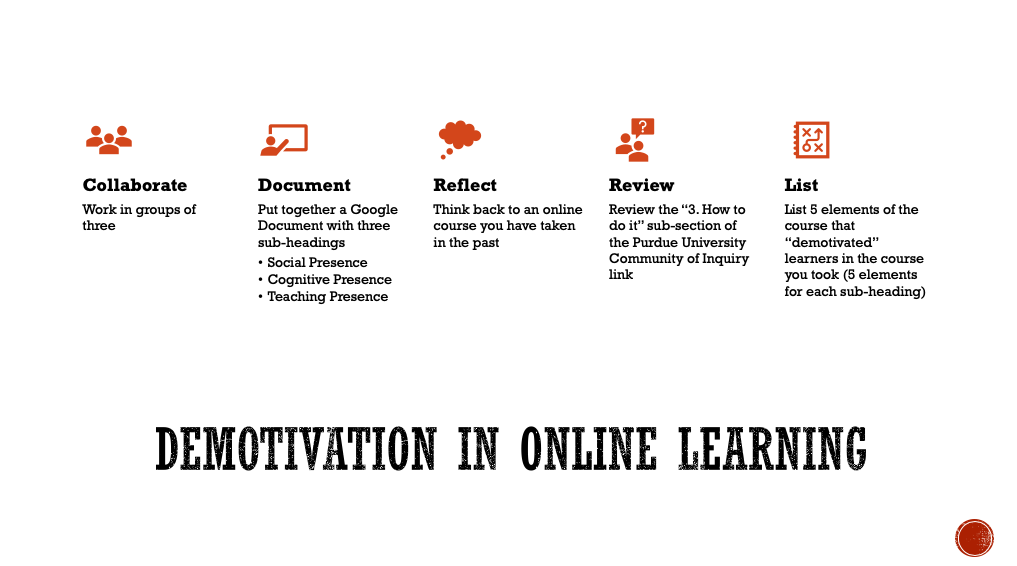1
eromerohall
In this chapter, I share an activity conducted with instructional design graduate students and the results of this activity. As part of this activity, the Community of Inquiry Framework was reviewed. The instructional design graduate students used their past experiences as learners in an online course(s) and identified elements of demotivation within each of the three categories of the Community of Inquiry Framework: social presence, cognitive presence, and teaching presence (see Fig. 1). This activity was conducted as part of a course (Principles of Learner Motivation; Instructor: Enilda Romero-Hall, Ph.D.; Semester: Summer 2020) in the Instructional Design and Technology master program at The University of Tampa.

Outcomes of the Activity
The following represent the elements of (de)motivation that instructional design graduate students identified. Some elements were mentioned more than once by several groups of instructional design graduate students but were listed once.
Social Presence (De)Motivation
- The instructor does not provide background information about themselves
- Lack of interaction with the instructor (synchronous or asynchronous)
- Lack of platform for students to communicate with each other (social interactions)
- Lack of team or collaborative activities
- Discussion boards
- Lack of icebreakers
- No synchronous meetings or video check-in option
- Not having virtual open office hours (Zoom, Skype, WebEx)
- If synchronous meetings occur, the instructor does not show face in the video (at all)
- Uneven distribution of attention to students during synchronous meetings
- Not being able to choose to work individually or in teams
- In team assignments, some team members pulling more weight than others
Cognitive Presence (De)Motivation
- Lack of variety in assignments
- Having discussion post assignments without further connecting it to the lesson
- Lack of interactive activities (for example: check your knowledge type of games)
- Lack of open-ended questions
- Classes that are completely lecture-based without discussion from students
- Lack of different media to present the content (PowerPoint only)
- Only one type of assignment (reading only)
- Only one type of assessment (multiple choice only)
- Overwhelming amounts of content
- No creativity (on presentation of the content)
- No practice exercises, only quizzes, and exams
- Not providing enough motivation or challenges for students of different abilities.
- Not providing frequent opportunities for assessment
- Not enough activities to practicing skills
Teaching Presence (De)Motivation
- Lack of flexibility
- No clarity in providing due dates
- Unclear instructions for assignments
- Lack of guided instruction/facilitation (just giving assignments)
- Lack of examples to illustrate a point or assignments
- Not providing real-world examples
- Feedback was only given to main assignments
- Lack of feedback or vague, non-constructive feedback
- Late feedback (wait until the end of the semester to grade everything)
- The faculty member is close-minded (“we have always done it this way”)
- Overcommunicating expectations and overwhelming students
- Not organizing the groups according to their abilities or to help peer support
- The instructor never discussed in the students’ discussion boards post and leaves it for the students to interact with each other only (lack of guidance)
- The instructor does not understand cultural differences and language barriers (cultural sensitivity)
